Young Woman Gets Angry At Her BF For Moving In His Unemployed Mother, Her BF, And Two Dogs Into Their Tinny Cottage
When you are in a relationship with someone, you are often also in a relationship with their family. Many people don’t even realize it because it is not always apparent—the parents are away, don’t keep in touch, etc.
But when a crisis hits, that’s when it becomes obvious—your partner’s parents are involved. And it is only natural.
You have to be there for your family, right? But how much is enough, and is there a line that shouldn’t be crossed?
Naturally, partners should discuss these boundaries before offering to help their parents. But that’s an ideal situation.
What happens in real life? Let’s ask a Reddit user with the handle u/RedNova02.
She asked the question: “AITA for being annoyed that my partner is moving his mum, her boyfriend, and their two dogs into our cottage?”
According to her, it is a “300+-year-old cottage with no garden, no driveway, and carpets in every room. It is not big enough for more than three people, let alone four adults, two dogs, a bird, and a reptile.”
That sounds pretty crowded. She is not thrilled with the arrangements, that’s for sure.
Who would be? “I’m annoyed because he doesn’t seem to understand the pressure this puts on me. I work two jobs to help us get by, I have studies to focus on, and I’m the only one of us who can drive.”
Let's take a look at her problem:
OP asks

Her partner's mom is being evicted, and she is moving in with her BF and two big, hairy dogs.

The house is an old cottage that doesn't have enough room or amenities for so many people and animals.

Research indicates that living with extended family can lead to heightened stress levels and interpersonal conflict, particularly in cramped living conditions. A study published in the Journal of Family Psychology suggests that cohabitation with in-laws or other relatives can intensify feelings of anxiety and frustration due to the loss of personal space and privacy. This loss is particularly acute in small living environments, like the 'tinny cottage' mentioned in the article, where boundaries can become blurred, leading to potential resentment and conflict between partners.
Furthermore, the psychological principle of territoriality provides insight into why shared living spaces might amplify these tensions. Territoriality refers to the emotional attachment and sense of ownership individuals feel toward their personal space, and violations of this space can trigger defensive responses.
Also, there is a question of expenses, which mom doesn't really want to discuss.

So, OP is pretty annoyed, and it is understandable. She works two jobs, studies, and drives her BF around. That's a lot to handle. And now she will have even more work around the house.
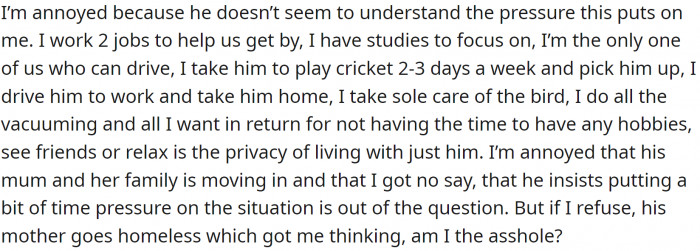
And, as we are used to seeing on Reddit, the first advice was to break up.
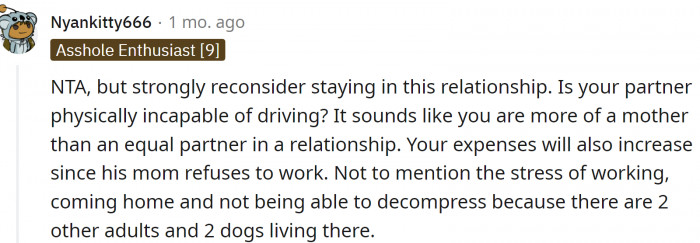
A licensed marriage and family therapist explains that when one partner involves family members in a shared living situation without mutual agreement, it can create a sense of imbalance in the relationship. This dynamic often leads to what psychologists describe as 'role confusion,' where individuals feel uncertain about their responsibilities and boundaries within the relationship. Dr. Alexandra Solomon, a relationship therapist, emphasizes that "clear communication about boundaries is essential to prevent misunderstandings and resentment" on her website dralexandrasolomon.com. Couples are encouraged to engage in discussions that clarify expectations and negotiate terms regarding family involvement, which can help mitigate feelings of anger and resentment.
OP clarified that her BF tried to get his driver's license only once.

Some Redditors tried to get some more info instead of suggesting a breakup right off the bat.

Mom is the guilty party here.

Dr. Sarah Thompson, a social psychologist at UCLA, emphasizes the importance of emotional intelligence in managing conflicts arising from cohabitation with family members. Her research shows that individuals who exhibit high levels of emotional intelligence are better equipped to navigate interpersonal conflicts, as they can recognize and address their own feelings while being sensitive to the emotions of others.
Building emotional intelligence involves practicing self-awareness, self-regulation, and empathy—skills that can be developed through mindfulness practices and reflective exercises. By cultivating these skills, individuals can approach difficult conversations about living arrangements with greater understanding and patience, potentially reducing the likelihood of anger and frustration.
Yes, she can.

OP should get her priorities straight.
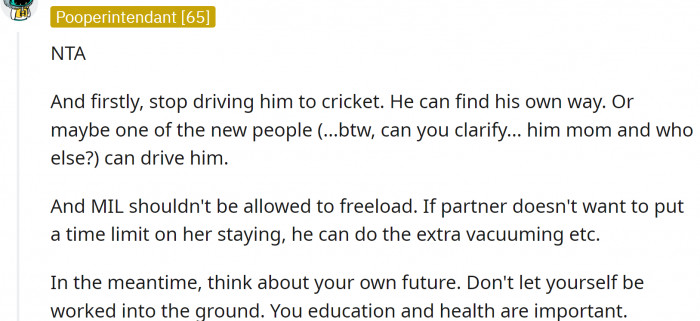
Her partner's actions are understandable.

Understanding the role of family dynamics can also provide insight into the current situation. Research indicates that family systems theory, which posits that individuals cannot be fully understood in isolation from their family relationships, can illuminate the complexities of this living arrangement. A study from the Journal of Family Therapy highlights how family roles, such as the caretaker or the dependent, can influence the behavior and attitudes of individuals within the family unit.
In this case, the boyfriend's decision to move in his mother might reflect deeply ingrained family patterns, including loyalty and obligation, which could be at odds with the girlfriend’s desire for independence and autonomy. Recognizing these patterns can assist both partners in understanding the underlying motivations driving their actions, thereby fostering a more empathetic dialogue.
Yes, hiding two dogs is a piece of cake....

This is really how it sounds.

And Redditors are suggesting (surprise, surprise)—a breakup. Again!

Practical solutions for couples facing similar challenges often involve establishing clear boundaries and expectations. A clinical psychologist suggests utilizing the 'I-statements' communication technique to express feelings without placing blame. For instance, a partner can say, 'I feel overwhelmed when the house is crowded,' instead of 'You always bring your mother and dogs here.' This approach encourages open dialogue while minimizing defensiveness.
Additionally, scheduling regular check-ins as a couple can help address any emerging issues related to the living arrangement. Research from the University of Pennsylvania indicates that couples who maintain consistent communication about their needs and feelings report higher satisfaction in their relationships.
But then OP shared some additional info to put things into perspective.

Her partner is a loving and caring man. He is her angel.

This is their first disagreement, as they usually see each other's point of view and reach understanding quickly.

Interpersonal conflict often arises from unmet needs, which can be particularly pronounced in shared living situations. According to Maslow's hierarchy of needs, individuals require a safe and stable environment to thrive; thus, overcrowding can lead to feelings of insecurity and frustration. A study from the Journal of Environmental Psychology illustrates how physical space significantly impacts mental well-being, with limited space often correlating with elevated stress levels.
To address these needs, couples should consider creating designated personal spaces within the shared environment, fostering a sense of ownership and privacy that can help alleviate tensions. This practice not only meets individual needs but also promotes mutual respect and understanding.
What's important is that her partner agreed to change many things.

And, thankfully, they seem to have reached an understanding.
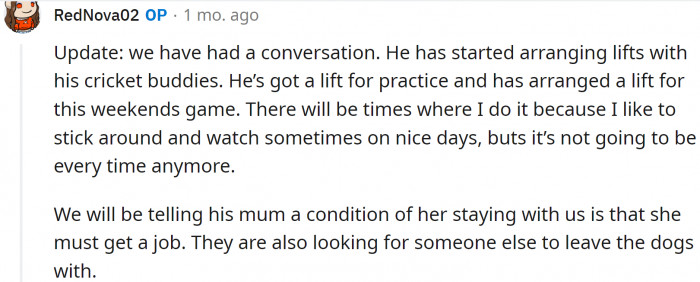
OP also clarified that she is not the only one working around the house.
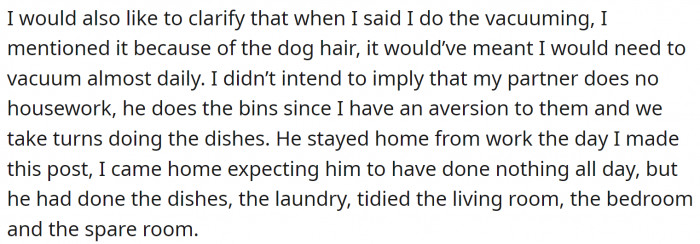
Finally, the emotional reaction the young woman is experiencing—anger—can be understood through the lens of the frustration-aggression hypothesis. This theory proposes that when individuals face obstacles to their goals, such as the desire for a private and peaceful living space, they may express anger as a natural response. Research has shown that individuals often redirect their frustration toward those closest to them, which can lead to conflicts in relationships.
Understanding this dynamic can empower her to explore healthier outlets for her feelings. Engaging in physical activity, journaling, or discussing feelings with a trusted friend can provide constructive ways to process and express emotions without damaging the relationship.
They seem like a nice couple. And we wish them all the best.

We can’t just let our family live on the street. After all, what’s family for?
But in some cases (almost all of them, sadly), you have to draw lines. Now, this cute couple is lucky they can see each other’s point of view and reach an understanding quickly.
They will be fine, we can tell. But what about other couples who don’t have such good communication?
Psychological Analysis
The situation described reveals a classic conflict where individual needs clash with family obligations, showcasing how the boyfriend's loyalty to his mother can create tension in his romantic relationship. This dynamic often stems from ingrained family patterns, where feelings of obligation can overshadow the couple's mutual needs for privacy and stability. Open communication about boundaries and emotional needs is crucial here, as it can help both partners navigate this tricky terrain without letting resentment build up.
Analysis generated by AI
Analysis & Alternative Approaches
In summary, the complexities of living with family members necessitate open communication, emotional awareness, and the establishment of clear boundaries. According to Dr. Alexandra Solomon, a relationship therapist, "Understanding the emotional needs of each individual is essential in navigating the challenges of shared living." Recognizing the importance of both individual and relational well-being can foster healthier interactions. As noted by Dr. John Gottman, a renowned marriage researcher, "Effective communication strategies and the creation of personal spaces are vital for couples to thrive amidst such challenges." By employing these strategies, couples can navigate these difficulties and ultimately strengthen their relationship.



